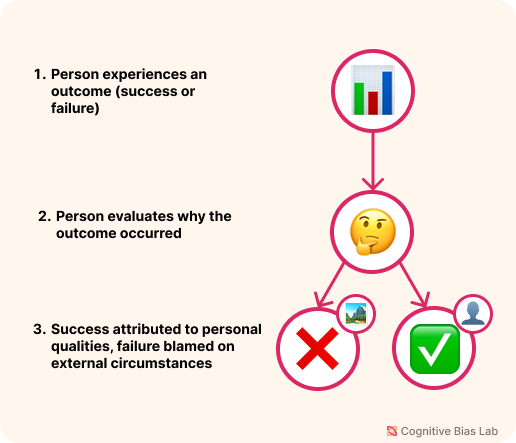Self-Serving Bias
Your progress on this bias test won't be saved after you close your browser.
Understanding Self-Serving Bias
Self-Serving Bias
We readily take credit for our successes but blame external factors for our failures. This self-protective tendency preserves our self-image while distorting our ability to learn and grow.
What Is Self-Serving Bias?
Self-serving bias is the tendency to attribute our successes to internal factors like skill or effort, while blaming external factors for our failures. This cognitive distortion helps protect our self-esteem and public image but can distort learning, reduce accountability, and undermine relationships.
How It Works
When we do well—ace a presentation, win a game, land a promotion—we’re quick to credit our intelligence, preparation, or natural ability. But when we fail, we’re more likely to cite bad luck, unfair treatment, or external obstacles. This selective attribution shields us from feeling inadequate but also impedes honest self-assessment.
Relationship to the Fundamental Attribution Error
Self-serving bias is closely related to the Fundamental Attribution Error, which involves overestimating dispositional factors (like personality) when explaining others’ behavior. The key distinction lies in the target of judgment: FAE typically applies when judging others, while self-serving bias is about explaining our own behavior.
For example, if a coworker misses a deadline, we might assume they’re lazy (FAE). But if we miss one, we’re more likely to blame a sudden emergency or unclear expectations (self-serving bias). Both biases reveal how we interpret actions through a lens that favors our self-concept or worldview.
Implications
Unchecked, this bias can hinder growth by externalizing failure and inflating ego. It can affect learning, teamwork, and leadership, especially when constructive feedback is deflected or success is over-attributed to personal greatness rather than collaborative effort or fortunate circumstances.
Understanding self-serving bias encourages more balanced self-reflection, greater empathy toward others, and improved resilience in the face of failure.

Visual representation of Self-Serving Bias (click to enlarge)
Examples of Self-Serving Bias
Here are some real-world examples that demonstrate how this bias affects our thinking:
Performance review blindness
A marketing manager receives a performance review with both positive and negative feedback. She readily embraces the praise about her creative campaigns but dismisses criticism about missed deadlines as "unrealistic timeframes set by management." By attributing success internally but failures externally, she misses the opportunity to improve her time management skills.
Team project dynamics
When a cross-departmental project succeeds, a team lead emphasizes how his strategic vision and leadership skills were pivotal. When the next project fails to meet objectives, he points to budget constraints, lack of executive support, and market changes. This pattern creates resentment among team members who notice they receive credit only when things go poorly.
Investment decisions
An investor tracks her portfolio performance and notices she mentally categorizes winning investments as resulting from her astute analysis and market insight. However, she views losing investments as caused by unpredictable market shifts or manipulation by institutional investors. This selective attribution prevents her from objectively evaluating her investment strategy and learning from mistakes.
How to Overcome Self-Serving Bias
Here are strategies to help you recognize and overcome this bias:
Balance Your Attributions
List both internal and external causes for every success or failure to ensure a more realistic and fair self-assessment.
Use Counterfactual Questions
Ask how success could have failed or how failure might have been avoided to explore alternative causes beyond your default view.
Test Your Understanding
Challenge yourself with these questions to see how well you understand this cognitive bias:
A project manager's team exceeds quarterly targets. In the debrief meeting, she emphasizes her strategic planning while downplaying favorable market conditions. When asked about last quarter's missed targets, she cites supply chain disruptions. What's happening?
Academic References
- Bradley, G. W. (1978). Self-serving biases in the attribution process: A reexamination of the fact or fiction question. Journal of Personality and Social Psychology, 36(1), 56–71. https://doi.org/10.1037/0022-3514.36.1.56
- https://academic.oup.com/ej/article/134/661/1835/7619130?login=false
- Wang, Y., Zhang, L., Wang, C., Lin, M., Zheng, L., & Guo, X. (2024). An Empirical Investigation of the Relationships Among Self-Esteem, Depression and Self-Serving Bias in People with Internet Gaming Disorder. Psychology Research and Behavior Management, Volume 17, 2557–2571.